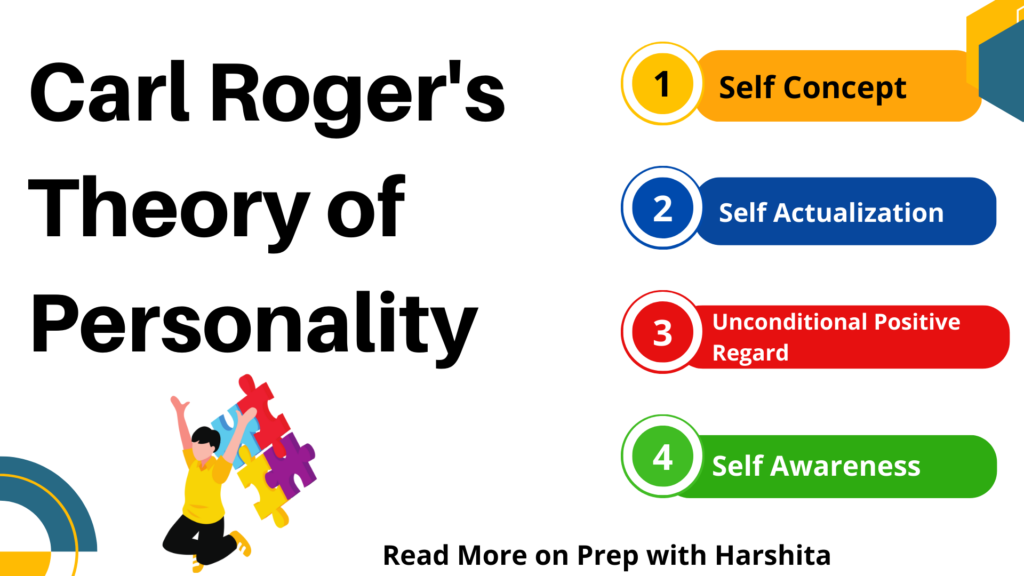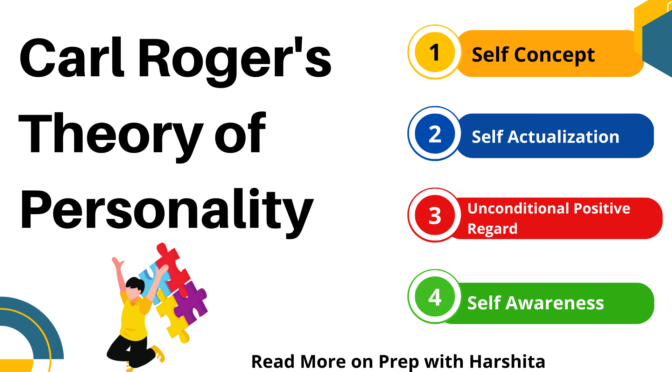Carl Rogers was an American psychologist who is known for his humanistic approach to psychology and his influential work on personality theory. Rogers believed that human beings have an innate tendency towards self-actualization, which is the process of realizing their full potential as individuals.
His personality theory emphasizes the importance of self-awareness, self-acceptance, and positive regard in the development of a healthy personality.
What is self actualization?
Self-actualization is a term used in psychology to describe the process of realizing and fulfilling one’s potential. According to the humanistic psychologist Abraham Maslow, self-actualization is the highest level of human development and represents the fulfillment of all other lower-level needs such as physiological, safety, love, and esteem needs.
Self-actualization involves a deep understanding and acceptance of oneself, a sense of purpose and direction in life, and a desire to continually grow and develop as an individual. It involves the pursuit of personal goals that are meaningful, challenging, and aligned with one’s values and beliefs.
Self-actualized individuals are said to have a strong sense of inner peace, autonomy, and creativity. They are often characterized by a deep appreciation of life and a sense of gratitude for their experiences. Maslow believed that self-actualization is a rare and elusive state that only a small percentage of people ever achieve, but that it is an important goal to strive for in life.
Rogers’ theory of personality has three core concepts: self-concept, incongruence, and unconditional positive regard.
- Self-concept: Self-concept refers to an individual’s perceptions and beliefs about themselves. It includes their thoughts and feelings about their abilities, personality traits, and values. Rogers believed that self-concept is developed through interactions with others, and that it is constantly evolving throughout a person’s life. He emphasized the importance of self-awareness in developing a positive self-concept.
- Incongruence: Incongruence refers to the discrepancy between an individual’s self-concept and their actual experiences. When there is a significant gap between the two, it can lead to feelings of anxiety, guilt, and self-doubt. Rogers believed that people have a natural drive towards reducing this incongruence by adjusting their self-concept or their experiences.
- Unconditional Positive Regard: Unconditional positive regard is the acceptance and support of another person without any conditions or judgement. Rogers believed that providing this type of support is crucial in the development of a healthy personality, as it allows individuals to feel valued and accepted for who they are, which in turn allows them to develop a positive self-concept.
Rogers believed that individuals have the potential to become fully functioning, meaning that they are able to reach their full potential. A fully functioning individual has a positive self-concept, is open to new experiences, is able to regulate their emotions effectively, and has a strong sense of personal identity. Rogers believed that everyone has the potential to become a fully functioning individual, but that this is often hindered by societal pressures and negative experiences.
Rogers’ theory also includes the idea of empathy and genuineness. Empathy is the ability to understand and share the feelings of another person. Rogers believed that therapists should have empathy for their clients in order to create a safe and accepting environment for them to explore their thoughts and feelings. Genuineness refers to the therapist’s ability to be authentic and sincere in their interactions with their clients.
In summary, Carl Rogers’ humanistic theory of personality emphasizes the importance of self-awareness, positive regard, and personal growth in the development of a healthy personality. By understanding and accepting themselves, individuals can become more fully functioning and reach their full potential.
Also Read : Freud Theory

Also Visit : Prep with Harshita


This excellent website certainly has all of the information and facts I wanted about this subject and didn’t know who to ask.
Your style is very unique compared to other people I have read stuff from. Thanks for posting when you have the opportunity, Guess I will just book mark this web site.
Great blog! Do you have any suggestions for aspiring writers? I’m hoping to start my own site soon but I’m a little lost on everything. Would you suggest starting with a free platform like WordPress or go for a paid option? There are so many options out there that I’m totally overwhelmed .. Any suggestions? Cheers!
Hmm is anyone else encountering problems with the images on this blog loading? I’m trying to find out if its a problem on my end or if it’s the blog. Any feed-back would be greatly appreciated.
Hi there are using WordPress for your site platform? I’m new to the blog world but I’m trying to get started and set up my own. Do you need any coding knowledge to make your own blog? Any help would be greatly appreciated!
This design is incredible! You certainly know how to keep a reader entertained. Between your wit and your videos, I was almost moved to start my own blog (well, almost…HaHa!) Wonderful job. I really loved what you had to say, and more than that, how you presented it. Too cool!
Thanks for your blog post. Some tips i would like to add is that computer memory ought to be purchased when your computer can’t cope with anything you do by using it. One can install two good old ram boards having 1GB each, for instance, but not certainly one of 1GB and one of 2GB. One should always check the manufacturer’s documentation for one’s PC to make certain what type of storage is needed.
Thanks a lot for giving everyone a very splendid opportunity to read from this web site. It’s always very kind plus packed with fun for me and my office colleagues to visit your web site particularly 3 times per week to study the latest items you have. Of course, I am also at all times satisfied with all the astonishing hints served by you. Certain 3 points on this page are in fact the most efficient we have all had.
Thanks for your post. I would also love to say that the first thing you will need to do is check if you really need credit improvement. To do that you have got to get your hands on a copy of your credit history. That should never be difficult, considering that the government necessitates that you are allowed to acquire one no cost copy of your credit report annually. You just have to consult the right people today. You can either look at website for that Federal Trade Commission and also contact one of the major credit agencies specifically.
Buy Private proxies: BEST PRIVATE PROXIES – Top-notch superior, Infinite data transfer, 1000 mb/s superspeed, 99,9 uptime, Not continuous IP’s, Not any use constraints, Various subnets, USA or The european countries proxies – Invest in Today – DreamProxies.com
I think this is among the most vital info for me. And i am glad reading your article. But should remark on few general things, The web site style is wonderful, the articles is really excellent : D. Good job, cheers
Buy top-notch high quality proxies – Totally anonymous ELITE private proxies with TOP higher level of safety measures exclusively coming from DreamProxies.com
Anonymous private proxies and then quick tempo proxy nodes https://DreamProxies.com – Get proxies currently!
50 OFF regarding all private proxies – pay for proxies these days at DreamProxies.com
análisis de vibraciones
Sistemas de ajuste: fundamental para el desempeño suave y efectivo de las equipos.
En el ámbito de la tecnología moderna, donde la efectividad y la fiabilidad del aparato son de alta importancia, los sistemas de calibración cumplen un rol fundamental. Estos aparatos adaptados están desarrollados para equilibrar y asegurar piezas dinámicas, ya sea en equipamiento industrial, automóviles de movilidad o incluso en electrodomésticos domésticos.
Para los expertos en soporte de dispositivos y los ingenieros, utilizar con sistemas de equilibrado es fundamental para promover el desempeño suave y seguro de cualquier sistema rotativo. Gracias a estas herramientas innovadoras innovadoras, es posible reducir notablemente las sacudidas, el ruido y la esfuerzo sobre los soportes, aumentando la vida útil de elementos importantes.
Asimismo significativo es el rol que cumplen los dispositivos de ajuste en la servicio al comprador. El soporte especializado y el conservación constante usando estos sistemas permiten proporcionar soluciones de gran estándar, elevando la bienestar de los usuarios.
Para los responsables de empresas, la aporte en estaciones de ajuste y sensores puede ser fundamental para mejorar la rendimiento y eficiencia de sus equipos. Esto es especialmente importante para los inversores que administran reducidas y pequeñas organizaciones, donde cada punto cuenta.
Asimismo, los sistemas de calibración tienen una extensa uso en el campo de la prevención y el supervisión de estándar. Facilitan encontrar probables problemas, previniendo mantenimientos costosas y problemas a los aparatos. Además, los datos generados de estos aparatos pueden usarse para mejorar sistemas y incrementar la exposición en motores de investigación.
Las zonas de uso de los dispositivos de equilibrado cubren numerosas industrias, desde la elaboración de ciclos hasta el seguimiento del medio ambiente. No influye si se trata de enormes producciones productivas o pequeños locales hogareños, los dispositivos de ajuste son esenciales para promover un operación efectivo y libre de paradas.
Vibracion del motor
Dispositivos de calibración: esencial para el desempeño uniforme y productivo de las dispositivos.
En el mundo de la ciencia actual, donde la efectividad y la estabilidad del equipo son de máxima significancia, los sistemas de ajuste juegan un papel fundamental. Estos dispositivos especializados están creados para equilibrar y estabilizar elementos dinámicas, ya sea en dispositivos productiva, transportes de traslado o incluso en electrodomésticos de uso diario.
Para los profesionales en reparación de dispositivos y los profesionales, manejar con aparatos de balanceo es fundamental para garantizar el operación fluido y seguro de cualquier mecanismo dinámico. Gracias a estas herramientas avanzadas sofisticadas, es posible reducir considerablemente las vibraciones, el sonido y la tensión sobre los sujeciones, extendiendo la vida útil de elementos valiosos.
De igual manera trascendental es el rol que tienen los equipos de equilibrado en la soporte al usuario. El asistencia profesional y el conservación regular utilizando estos equipos posibilitan proporcionar prestaciones de óptima nivel, elevando la agrado de los consumidores.
Para los dueños de negocios, la aporte en estaciones de equilibrado y dispositivos puede ser clave para mejorar la efectividad y rendimiento de sus dispositivos. Esto es especialmente relevante para los dueños de negocios que administran reducidas y modestas negocios, donde cada detalle es relevante.
Por otro lado, los aparatos de equilibrado tienen una extensa utilización en el área de la fiabilidad y el control de calidad. Habilitan identificar eventuales fallos, impidiendo reparaciones onerosas y problemas a los equipos. Además, los indicadores recopilados de estos dispositivos pueden utilizarse para perfeccionar sistemas y potenciar la presencia en plataformas de consulta.
Las sectores de utilización de los dispositivos de calibración abarcan diversas ramas, desde la elaboración de transporte personal hasta el supervisión de la naturaleza. No interesa si se refiere de enormes elaboraciones de fábrica o pequeños locales hogareños, los sistemas de balanceo son fundamentales para garantizar un rendimiento productivo y sin riesgo de detenciones.
as I website owner I conceive the articles here is rattling excellent, regards for your efforts.